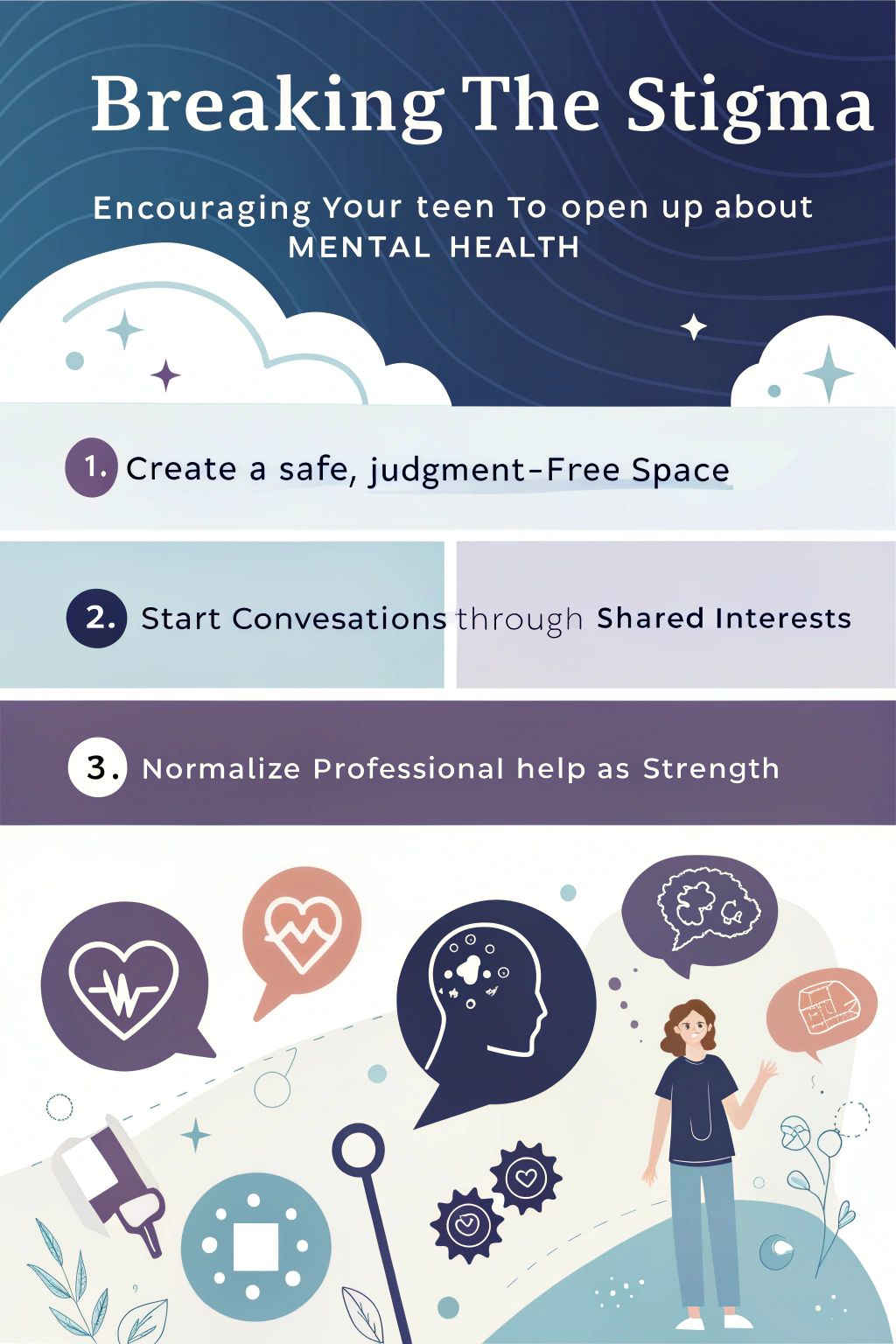Breaking The Stigma: Encouraging Your Teen To Open Up About Mental Health
Text content
Talking to your teen about mental health can feel tough, but it’s crucial for their well-being. Many teens struggle with anxiety, depression, or stress, yet they often keep it to themselves.
This blog will show you how to create a safe space for them to open up. Keep reading to learn how to break the stigma and support your teen.
Key Takeaways
- Create a safe, judgment-free space for teens to share their emotions. Use phrases like “I’m here for you” to build trust.
- Respect teens’ privacy while setting healthy boundaries. Encourage them to open up at their own pace.
- Use shared interests, like music or hobbies, to start conversations about mental health.
- Watch for signs of stress, anxiety, or depression, such as mood changes, sleep issues, or social withdrawal.
- Guide teens toward professional support, like therapy or telemental health, and normalize seeking help as a strength.

Fostering a Supportive Environment for Teen Mental Health
Creating a safe space starts with open conversations, where teens feel free to express their emotions without fear of judgment. Set clear boundaries that respect their privacy, while showing them they’re not alone in their struggles.
Encourage Open Dialogue Without Judgment
Teens often struggle to share their feelings, fearing judgment or misunderstanding. Parents and caregivers can help by fostering a safe space for open dialogue. Actively listen without interrupting, showing empathy and understanding.
Use phrases like “I’m here for you” instead of giving immediate advice.
Avoid dismissing their emotions as trivial or overreacting. Validate their struggles with statements like “That sounds tough.” Incorporate mindfulness practices, like journaling or meditation, to help them express themselves freely.
Keep conversations casual and non-confrontational, using shared interests as a starting point to build trust and reduce stigma around mental health issues.
Maintain Privacy and Set Healthy Boundaries
Creating a safe space for your teen starts with respecting their privacy. Teens value confidentiality, especially when discussing mental health topics like stress or anxiety disorders.
Avoid prying into every detail of their life. Instead, let them share at their own pace. Setting boundaries also means being clear about what conversations stay private and what might need professional help from therapists or school counselors.
Healthy boundaries build trust and encourage open dialogue about issues such as self-injury or struggling with peer support. Give them the freedom to express emotions without fear of judgment.
At the same time, gently guide them toward resources like cognitive behavioral therapy (CBT) if needed. Balancing respect for their space with active listening helps teens feel understood and supported in managing mental well-being.
Techniques to Improve Communication About Mental Health
Start conversations by linking mental health topics to hobbies or activities your teen enjoys. Share your own experiences to build trust and show vulnerability, creating a safe space for open dialogue.

Incorporate Common Interests and Cultural References
Talking about mental health with teens doesn’t have to feel heavy or awkward. Use their interests, like music, sports, or video games, as a starting point. For example, if they love a certain band or show, bring up how the characters handle stress or friendship issues.
Cultural references can also help bridge gaps in understanding. Sharing stories from movies or books they enjoy makes conversations feel natural and relatable.
Personal experiences create trust and connection. If you’ve faced challenges like stress or sadness, share them briefly. Teens are more likely to open up when they see vulnerability modeled.
This approach works well for single dads fostering emotional regulation in their kids while reducing stigmas around mental illness and substance use among adolescents. Keep it simple, keep it real, and let common ground guide the talk.
Share Personal Stories to Establish Trust
Sharing personal stories can build trust with teens. It shows them they’re not alone in their struggles. Parents or caregivers can talk about their own experiences with stress, anxiety, or coping mechanisms.
This helps teens feel more comfortable opening up about their mental health conditions.
Teens often relate better when they hear real-life examples. Discussing challenges like mood swings or difficulty falling asleep creates a safe space for dialogue. Personal anecdotes also break down stigma around mental health issues and encourage seeking therapy sessions or professional help without shame.

Recognizing and Responding to Mental Health Signs
Watch for mood shifts, like sudden anger or sadness. Help your teen connect with counseling or stress management tools early.
Detect Early Symptoms of Stress, Anxiety, or Depression
Teens often show signs of stress, anxiety, or depression in subtle ways. Parents, caregivers, and educators can spot these signs with careful observation.
- Look for mood changes in teens, like sudden irritability or anger. These shifts may indicate emotional struggles.
- Notice if a teen withdraws from friends or family. Social isolation can signal deeper mental health problems.
- Pay attention to changes in sleep patterns, such as insomnia or excessive sleeping. Disrupted sleep often links to stress or anxiety.
- Watch for a loss of interest in hobbies or activities they once enjoyed. This could point to feelings of hopelessness.
- Monitor for physical symptoms like headaches or stomachaches. These can sometimes stem from psychological stress.
- Be aware of sudden changes in school performance. Struggling in class may reflect underlying mental health issues.
- Keep an eye on signs of substance abuse. Teens may turn to drugs or alcohol to cope with stress.
- Observe non-verbal cues, like constant tiredness or changes in appetite. These can hint at anxiety or depression.
- Listen for negative self-talk or feelings of low self-worth. Such thoughts often accompany depression.
- Consider seeking help from a mental health professional if these signs persist. Early intervention can make a big difference.
Guide Teens to Seek Professional Mental Health Support
Talking to teens about professional mental health support can make a big difference. Start by normalizing the idea of seeking help, so they feel less alone.
- Suggest telemental health options if they feel uncomfortable visiting a therapist in person. This offers flexibility and privacy for teens.
- Introduce the concept of dialectical behavior therapy (DBT) for managing emotions and stress. It’s a proven method for building resilience.
- Share stories of mental health advocates who openly discuss their struggles. This helps reduce the mental health stigma around seeking help.
- Recommend starting with family therapy if they prefer a collective approach. It can improve communication and support at home.
- Explain the benefits of trauma-informed care for those dealing with past experiences. It focuses on safety and healing.
- Encourage teens to explore coping strategies like stress reduction techniques or physical activity. These complement professional care.
- Highlight the importance of culturally sensitive therapists who understand their background and experiences.
- Discuss how behavioral health professionals can help with specific challenges, like self-harm or PTSD.
- Offer to help research local mental health professionals or clinics in San Mateo. Make it easier for them to take the first step.
- Remind them that recovery is a journey, and seeking help is a sign of strength, not weakness.
Using these steps, you can guide teens toward the support they need, while fostering trust and understanding.

Conclusion
Breaking the stigma around teen mental health starts at home. Create a safe space where your teen feels heard, and valued. Show empathy, listen without judgment, and guide them toward resources.
Small steps lead to big changes in their mental wellness and confidence. Together, we can build a future where openness replaces silence.
FAQs
1. How can I help my teenager feel comfortable talking about mental health?
Start by creating a safe space, and use empathetic communication tips. Show understanding, avoid stigmatizing language, and encourage open conversations about mental wellness.
2. What role does education play in breaking the stigma around mental health?
Education helps teenagers understand mental health illnesses. It teaches them relaxation techniques, decision-making skills, and ways to relieve stress, reducing fear and judgment.
3. How can single fathers support their teens’ mental health during adolescence?
Single fathers can build trust, listen without judgment, and encourage healthy habits. They can also seek guidance from experts like Dr. Adekemi “Dr. O” Oguntala, known as TheTeenDoc.
4. What are some signs my teen might be struggling with loneliness or online harassment?
Watch for changes in behavior, like withdrawing from peers or losing interest in activities. Encourage them to share their feelings, and offer support without pressure.
5. How can exercises and relaxation techniques improve my teen’s mental health?
Exercises and relaxation techniques, like deep breathing or mindfulness, can relieve stress. They help teens manage emotions, build resilience, and improve overall mental wellness.

Dr. O “TheTeenDoc.” helps clinicians communicate better with their teen patients. She speaks, blogs www.TheTeenDoc.com, researches and consults on communicating with teens. She has written two e-books for parents and teens on communicating about the challenging subject of sexual health. You know, teens that bring chief complaints of belly pain, social crisis, emotional turmoil and obnoxious parents. Or, is it the parents with obnoxious teens? Sometimes she mixes that complaint up.
Dr. O speaks www.TheTeenDoc.com to and is consulted by clinicians who want advice managing difficult teen and teen-parent situations. These situations frustrate clinicians and slow down their clinics making them wonder if they’ll ever walk out the door for the day. Every day, in her own practice, Dr. O helps clinicians communicate better with teens and helping you is another level of reward. Her talks are fun and informative, and her delivery empowers clinicians to actually think teens are an awesome group to work with. Her energy about teens is contagious and has inspired her coaching clients to have less fear and more confidence with the teens in their panel. Her dedication to seeing you succeed with a group she is so passionate about is what makes Dr. O’s Lounge the place you want to be!
If you are a clinician that has teen’s in your practice, from pediatrics to internal medicine, the person with whom you need to connect is Dr. O “TheTeenDoc!” You can listen to a complimentary audio “The Art of Teen Medicine” and recommend her e-book “Are You Serious? It’s Just Sex!” to your patients. And while you’re there, become part of Dr.O’s Lounge.
Specialties: consulting, coaching, counseling, mental health, research, seminars, spanish, public speaker, teaching, communications between teens and adults



